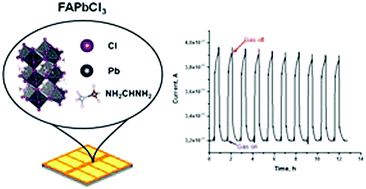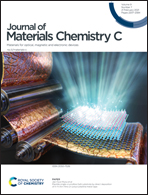Highly sensitive and selective ammonia gas sensor based on FAPbCl3 lead halide perovskites†
Abstract
Organic–inorganic hybrid halide perovskites exhibit a wide range of unique optoelectronic properties that can be applied to a variety of semiconducting photoelectronic devices. There is also a growing interest in using perovskites as sensor materials for detecting various gas-phase analytes. In the present work, we report the design and investigation of a gas sensor based on formamidinium lead chloride (FAPbCl3), which demonstrated a strong and highly selective response towards ammonia. These observations were confirmed by our calculations to be due to a “lock-and-key” mechanism of the ammonia molecule filling the chlorine-vacancy defect, which effectively healed the carrier trap created by such a defect. A good reversibility and operational stability of the devices at room temperature was also observed, suggesting that complex lead halides are highly promising families of materials for gas sensor and electronic nose applications.



 Please wait while we load your content...
Please wait while we load your content...